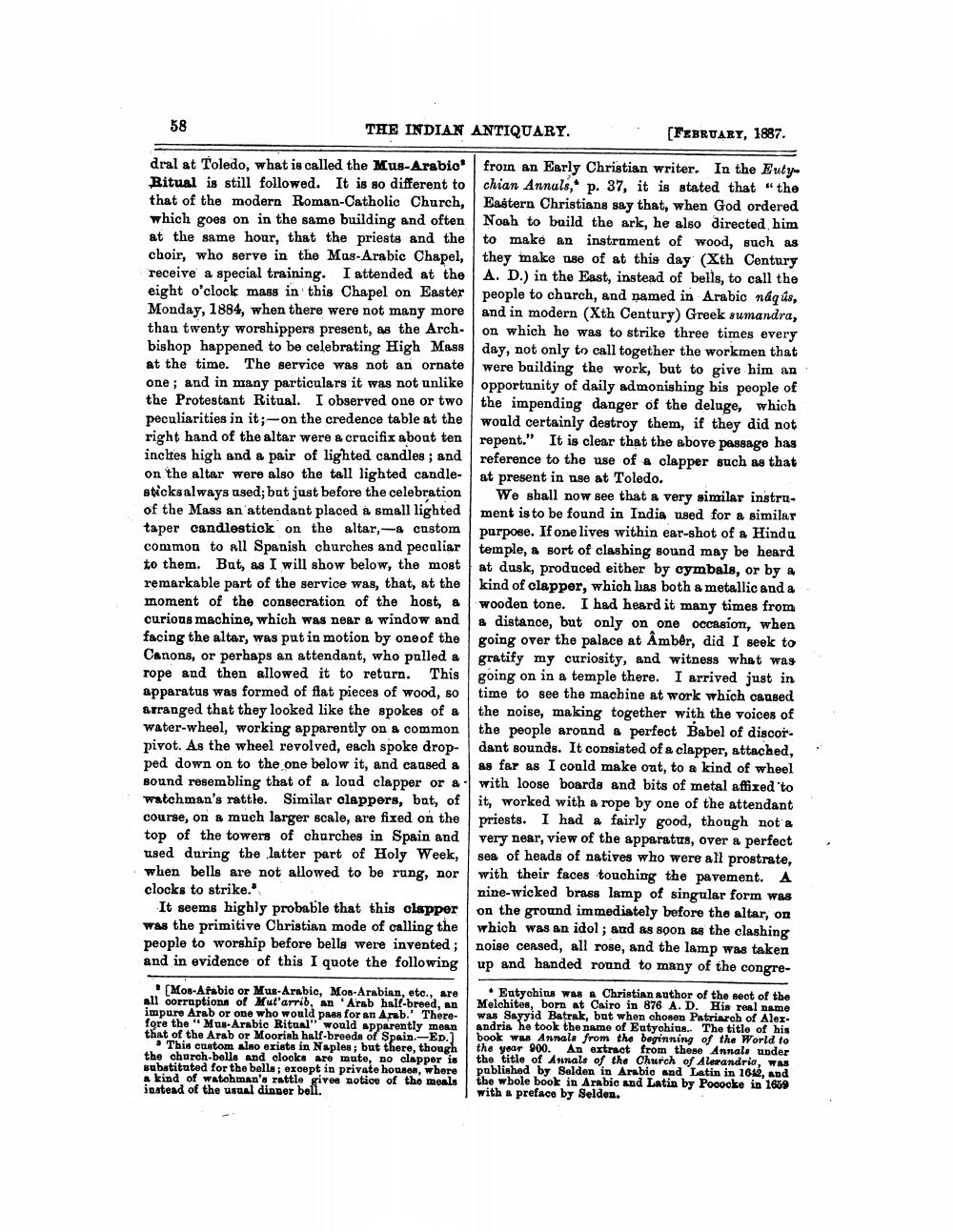________________
58
THE INDIAN ANTIQUARY.
[FEBRUARY, 1887.
dral at Toledo, what is called the Mus-Arabic froin an Early Christian writer. In the Euty Ritual is still followed. It is so different to chian Annals, p. 37, it is stated that “the that of the modern Roman Catholic Church, Eastern Christians say that, when God ordered which goes on in the same building and often Noah to build the ark, he also directed him at the same hour, that the priests and the to make an instrument of wood, such as choir, who serve in the Mus-Arabic Chapel, they make use of at this day (Xth Century receive a special training. I attended at the A. D.) in the East, instead of bells, to call the eight o'clock mass in this Chapel on Easter people to church, and named in Arabic náqús, Monday, 1884, when there were not many more and in modern (Xth Century) Greek sumandra, than twenty worshippers present, as the Arch- on which he was to strike three times every bishop happened to be celebrating High Mass day, not only to call together the workmen that at the time. The service was not an ornate were building the work, but to give him an one; and in many particulars it was not unlike opportunity of daily admonishing bis people of the Protestant Ritual. I observed one or two the impending danger of the deluge, which peculiarities in it;-on the credence table at the would certainly destroy them, if they did not right hand of the altar were a crucifix about ten repent." It is clear that the above passage has inches high and a pair of lighted candles; and reference to the use of a clapper such as that on the altar were also the tall lighted candle- at present in use at Toledo. sticks always used; but just before the celebration We shall now see that a very similar instru. of the Mass an'attendant placed a small lighted ment is to be found in India used for a similar taper candlestick on the altar, - custom purpose. If one lives within ear-shot of a Hindu common to all Spanish churches and peculiar temple, a sort of clashing sound may be heard to them. But, as I will show below, the most at dusk, produced either by cymbals, or by a remarkable part of the service was, that, at the kind of clapper, which luas both a metallic and a moment of the consecration of the host, a wooden tone. I had heard it many times from curious machine, which was near a window and a distance, but only on one occasion, when facing the altar, was put in motion by one of the going over the palace at Amber, did I seek to Canons, or perhaps an attendant, who pulled a gratify my curiosity, and witness what was rope and then allowed it to return. This going on in a temple there. I arrived just in apparatus was formed of flat pieces of wood, so time to see the machine at work which caused arranged that they looked like the spokes of a the noise, making together with the voices of water-wheel, working apparently on a common the people around a perfect Babel of discorpivot. As the wheel revolved, each spoke drop- dant sounds. It consisted of a clapper, attached, ped down on to the one below it, and caused a as far as I could make out, to a kind of wheel sound resembling that of a loud clapper or a with loose boards and bits of metal affixed to watchman's rattle. Similar clappers, bat, of it, worked with a rope by one of the attendant course, on a much larger scale, are fixed on the priests. I had a fairly good, though nota top of the towers of churches in Spain and very near, view of the apparatus, over a perfect used during the latter part of Holy Week, sea of heads of natives who were all prostrate, when bells are not allowed to be rung, nor with their faces touching the pavement. A clocks to strike.
nine-wicked brass lamp of singular form was It seems highly probable that this clapper on the ground immediately before the altar, on was the primitive Christian mode of calling the which was an idol; and as soon as the clashing people to worship before bells were invented; noise censed, all rose, and the lamp was taken and in evidence of this I quote the following up and handed round to many of the congre
. [Mos-Arabic or Mus-Arabic, Mos-Arabian, etc., are Eutychius was a Christian author of the Best of the all corruptions of Mut'arrib, an Arab half-breed, an Melchites, born at Cairo in 876 A. D. His real name impure Arab or one who would pass for an Arb. There- was Sayyid Batrak, but when chosen Patriarch of Alex. fore the "Mus-Arabic Ritual" would apparently mean andris he took the name of Eutychius. The title of his that of the Arab or Moorish half-breeds of Spain. -ED.) book WAS Arunale from the beginning of the World to
This custom alao exists in Naples; but there, though the year 900. An extract from these Annals under the church bells and clooks are mute, no clapper is the title of Annals of the Church of Alerandria, WAS sabatitated for the bells; except in private houses, where I published by Selden in Arabic and Latin in 1642, and
kind of watchman's rattle give notice of the meals the wbole book in Arabic and Latin by Pooooke in 1659 instead of the usual dinner bell.
with a preface by Selden.




